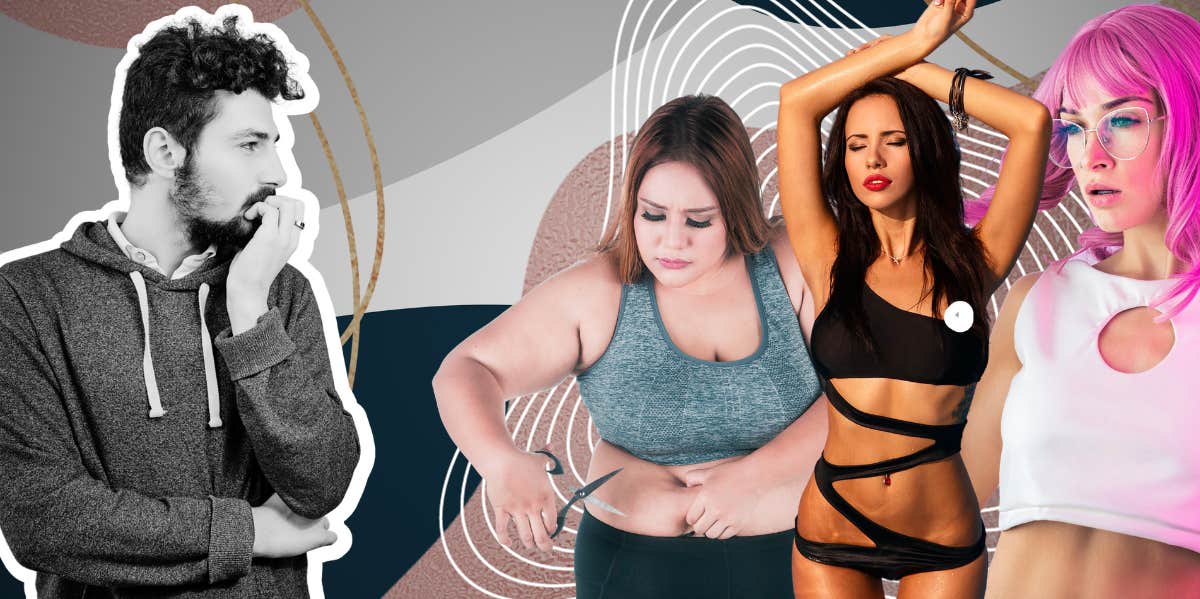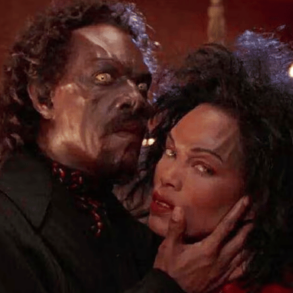
Editor’s Note: This is a part of YourTango’s Opinion section where individual authors can provide varying perspectives for wide-ranging political, social, and personal commentary on issues.
We put women into boxes because we see them as commodities to be marketed for the benefit of men who want to easily pick up just the kind of woman they want.
That’s why we compartmentalize women as madonnas and wh*res. The tradwives and sl*ts. The girl bosses and the manic pixie dream girls. The party girls and the tomboys and the Miss Goodie Two-Shoes. The gold-diggers. The fashionistas. The maneaters and hippies and girly girls and all the rest. I could go on all day and so could you.
We have a few such boxes we put men into: Mr. Right, alphas, boy toys, incels … I’m running out already. Men are seldom turned into a commodity like that.
We don’t put men into boxes in quite the same way.
And I have a theory about that: Women have been socialized to package themselves as something a man might want to choose.
Men have not. They are seen as the choosers and women as the products to be chosen.
This dates back to the days when we had to attract a husband to survive. When we weren’t allowed to have a career, it was important to make ourselves as appealing to men as possible so one of them would choose us and support us. That meant elaborate grooming, an expensive wardrobe, and lessons in dancing and etiquette.
Did men have to market themselves as something women would choose? Not in the same way. Many women would accept the first man to check the boxes demanded by her station in life. Unless you were a highly sought-after beauty from a wealthy, aristocratic family, you didn’t dare take chances and risk becoming an old maid.
Men didn’t have to worry. A man could take his time. If he didn’t marry until he was much older, it was fine. If he decided as a paunchy, balding old man missing a few teeth that he was finally ready to marry a lovely young girl to provide him with an heir, that was just fine with everyone, including the lovely young girl, who was probably relieved that she was going to have someone to support her.
And if she didn’t like it? Too bad. In some cases, she had about as much say in who would marry her as a packaged product on the shelf has about who is going to buy it.
Real people aren’t just one thing.
Some feminists love to bake cookies. Some women dress to the nines when they go out but revel in their comfy yoga pants the rest of the time. Some tradwives have affairs. Some sex-positive women are happy to self-identify as “sl*ts” but settle right down into contented monogamy when they’re ready to commit to one person. No woman is just one thing. We all have many facets, and who we are changes as life happens.
Some women put great effort into their appearance when they’re young but stop making the effort after a few years. Some men claim this is a matter of women letting themselves go, or of no longer making an effort once they’ve “snagged” a man.
But that’s nonsense. They haven’t let themselves go; they have moved onto a different stage of life and no longer have time for elaborate grooming rituals. Maybe they don’t have time because they’re working a demanding job while also raising children — or perhaps they no longer feel that their self-worth depends upon their ability to maintain a certain look. And they’re under no obligation to try to maintain a certain look forever.
Here’s a handy guide to better judge women.
Do you like to take one glance at women and start making value judgments based on their personal style? Well, this is your lucky day.
Here’s a handy guide to help you know what each thing tells you about women:
- She has blue, green, or hot pink hair: She decided to color her hair.
- She’s wearing sexy, revealing clothes: She felt like wearing that look today.
- She’s wearing baggy clothes that give no hint of her body: She decided to wear baggy clothes today.
- She has tattoos: At some point, she decided to get those tattoos.
- She is thin: Her body type is none of your business.
- She is heavy: Her body type is none of your business.
- She has very long hair: She decided not to cut her hair short.
- She has very short hair: She decided to cut her hair short.
- She’s wearing elaborate makeup: She wanted to wear makeup today.
- She’s not wearing any makeup at all: She didn’t want to wear any makeup today.
It turns out you can’t tell much of anything for sure by how someone looks during one moment in time.
You’re going to have to actually talk to a woman to see if her values and interests align with yours. In that way, we are just like men!
When I met my husband, I was slightly concerned he might not be interested in me because I was overweight and he was exceptionally fit and muscular. It’s a good thing I didn’t let my assumption keep me from getting to know him — I’d have missed out on 17 years of a happy marriage.
I can think of many other men I dated who were nothing like I assumed at first glance — and many friends who were very different from what I assumed they’d be like when I first met them.
You actually can pick up some information about a person by their dress, bearing, and manner of speaking, of course, but it’s just a crude approximation, and many times, people will surprise you.
People don’t stay the same, either.
None of us is just one thing. We are complicated, contradictory individuals and we can evolve a lot over the decades of our lives. If you mentally put them into a box, be aware that the box might not fit them a few years later.
The people who knew me as a shy, introverted little kid might have been surprised to see me socializing so much in college.
The people who knew me in college might have been surprised to see how happy I was at home, kneading bread dough with a baby in a sling. The people who knew me as a sweet SAHM might have been surprised to see my tough side when I was running a newsroom and managing staff.
I’ve also gone from being the girl who didn’t leave the house without spending an hour on my appearance to the woman who routinely leaves the house without a lick of makeup.
Probably most people can tell a similar tale — because we’re humans, not products, and humans change.
Michelle Teheux is a freelance writer, journalist, and former newspaper editor who writes about her experiences abroad.
This article was originally published at Medium. Reprinted with permission from the author.
This post was originally published on this site be sure to check out more of their content.









